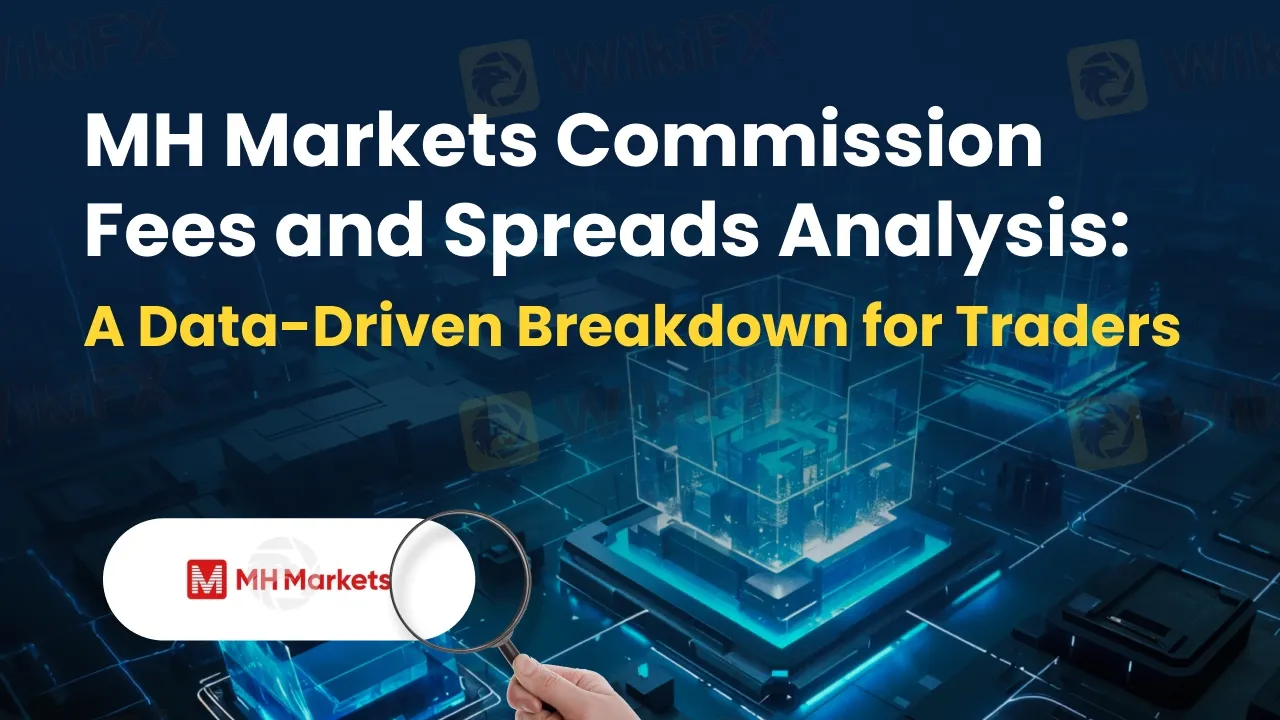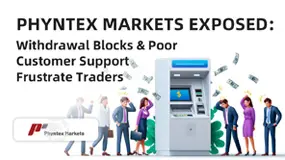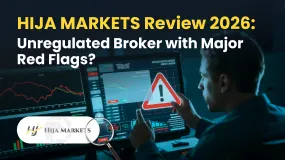Abstract:For any experienced trader, the long-term viability of a brokerage partner hinges on a delicate balance of trust, execution quality, and, critically, cost. Trading fees, both direct and indirect, can significantly erode profitability over time. This makes a granular understanding of a broker's cost structure not just beneficial, but essential. This in-depth analysis focuses on MH Markets, breaking down its commission fees, spreads, and other associated costs to provide a clear, data-driven perspective for traders evaluating this broker for their long-term strategies.
Drawing primarily on verified data from the global broker inquiry platform WikiFX, alongside other public information, we will dissect the MH Markets spreads commissions cost structure. We aim to move beyond marketing claims and uncover the practical, real-world costs of trading with this broker, helping you determine if its pricing model aligns with your trading style and financial goals.

For any experienced trader, the long-term viability of a brokerage partner hinges on a delicate balance of trust, execution quality, and, critically, cost. Trading fees, both direct and indirect, can significantly erode profitability over time. This makes a granular understanding of a broker's cost structure not just beneficial, but essential. This in-depth analysis focuses on MH Markets, breaking down its commission fees, spreads, and other associated costs to provide a clear, data-driven perspective for traders evaluating this broker for their long-term strategies.
Drawing primarily on verified data from the global broker inquiry platform WikiFX, alongside other public information, we will dissect the MH Markets spreads commissions cost structure. We aim to move beyond marketing claims and uncover the practical, real-world costs of trading with this broker, helping you determine if its pricing model aligns with your trading style and financial goals.
MH Markets at a Glance: Key Operational and Regulatory Profile
Before delving into the fee specifics, it's crucial to establish a foundational understanding of the broker's operational standing. MH Markets, also operating under the name Mohicans Markets (Ltd), has been in business for 5-10 years, indicating a degree of market longevity. Registered in Mauritius, the broker has built a global presence, which is reflected in its multi-jurisdictional regulatory framework.
According to public records and WikiFX data, MH Markets holds licenses from several authorities:
• ASIC (Australia): It is regulated by the Australian Securities and Investments Commission, a top-tier regulator, under a Straight Through Processing (STP) license. This provides a high level of assurance, particularly regarding the segregation of client funds.
• VFSC (Vanuatu): For its international client base, the broker is regulated by the Vanuatu Financial Services Commission. This offshore regulation allows it to offer more flexible conditions, such as higher leverage, which are restricted in stricter jurisdictions such as Australia.
• SCA (United Arab Emirates): This is a point of significant caution. WikiFX issues a prominent risk alert stating that MH Markets “exceeds the business scope regulated by the United Arab Emirates SCA (license number: 20200000159) Investment Advisory Licence Non-Forex License.” This means its forex brokerage activities are not covered by its UAE license, a critical detail for traders in that region.
Overall, WikiFX assigns MH Markets a score of 7.08 out of 10. This score reflects a broker with a solid operational history and some strong regulatory credentials (ASIC) but is tempered by notable risks, such as the warning regarding its UAE operations.
The Core of Trading Costs: MH Markets Spreads and Commissions Cost Structure
The primary costs incurred during trading are spreads and commissions. MH Markets employs a tiered account system, meaning these costs vary significantly depending on the account type a trader chooses. This flexibility allows traders to select a structure that best suits their strategy, whether they are a high-frequency scalper or a long-term position trader.
Account-Based Fee Analysis
Based on data from user reviews on WikiFX and other public sources, MH Markets offers three primary account types, each with a distinct fee model.
Let's break down what this means for different types of traders:
• Standard Account: With a low entry barrier of just $50 and a commission-free structure, this account is clearly designed for beginners or those testing the broker's environment. The cost is bundled entirely into the spread, which starts from 1.0 pips on major pairs such as EUR/USD. While simple to understand, these spreads are not the most competitive on the market and may be costly for active traders.
• Prime Account: This account represents a compelling middle ground. For a minimum deposit of $100, traders gain access to significantly tighter spreads, starting from 0.6 pips on EUR/USD, while remaining commission-free. This model is suited for intermediate to advanced manual traders who execute a moderate volume of trades and prefer the simplicity of an all-in spread cost.
• ECN Account: Tailored for professionals, scalpers, and algorithmic traders, the ECN account requires a higher minimum deposit of $1,000. In return, it offers access to raw, interbank spreads that can be as low as 0.0 pips during periods of high liquidity. The trading cost is realized through a fixed commission of $7 per round-turn lot. This transparent structure is ideal for strategies that rely on capturing small price movements, where minimizing the bid-ask spread is paramount.
Evaluating Competitiveness: How Do These Costs Stack Up?
The competitiveness of the MH Markets commission fees and spreads analysis depends heavily on the chosen account.
The ECN account's $7 round-turn commission is in line with the industry standard, which typically ranges from $6 to $8. Its competitiveness, therefore, depends entirely on the quality and consistency of the “raw” spreads provided. If the broker consistently delivers near-zero spreads on major pairs, this account is highly competitive for its target audience.
The Prime account's commission-free spreads from 0.6 pips are quite attractive. Many brokers offering commission-free trading have standard spreads closer to 1.0-1.2 pips. This makes the Prime account a strong contender for cost-conscious swing and day traders.
The Standard account's spreads from 1.0 pips are average. While not exorbitant, they are noticeably higher than the most competitive offerings in the industry. Traders planning to trade with any significant frequency would likely find better value in the Prime or ECN accounts.
This multi-tiered pricing is reflected in WikiFX's independent “Cost” rating for MH Markets, which is 'B'. This grade suggests that while the broker offers some competitive pricing options (likely its ECN and Prime accounts), its overall cost structure is not considered among the absolute cheapest in the market. Traders can find lower costs elsewhere, but MH Markets provides a reasonable and transparent framework.
Beyond the Trade: Analyzing Non-Trading Fees
Experienced traders know that profitability is also affected by costs incurred outside of active trading. These non-trading fees, while sometimes small, can accumulate over time.
• Deposit and Withdrawal Fees: MH Markets follows the industry standard of not charging fees for deposits. However, third-party payment processors may levy their own charges. For withdrawals, the costs vary by method. According to public information, bank wire transfers may incur a fee of around $20, which is standard. Withdrawals to e-wallets are often free, at least for the first transaction in a given period, making them a more cost-effective option for managing funds.
• Inactivity Fees: For accounts that remain dormant (no trading activity), MH Markets may charge an inactivity fee. Public sources indicate this is approximately $10 per month after a 90-day period of dormancy. This is a common practice designed to cover the administrative costs of maintaining inactive accounts and is in line with industry norms. Traders should simply be aware of this policy if they plan to take an extended break from trading.
• Overnight Financing (Swaps/Rollover): For traders who hold positions open overnight, swap fees are a critical component of the overall cost. WikiFX's detailed environmental survey gives MH Markets a 'B' rating for Rollover. This suggests that its swap rates are competitive but not necessarily the best available. Position and swing traders who frequently hold multi-day trades should carefully check the specific swap rates for their preferred instruments within the MT4/MT5 platform before committing to a long-term position.
Trading Environment and Execution Quality: The Hidden Cost Factor
Low spreads and commissions are meaningless if orders are executed poorly. Slippage, platform instability, and slow execution can result in costs that far exceed the advertised fees. WikiFX's technical evaluation of the MH Markets trading environment provides crucial insights.
• Execution Speed: The average transaction speed is recorded at 248.4 ms. This is an average speed, perfectly acceptable for most manual day trading and swing trading strategies. However, it may not be fast enough for certain high-frequency trading (HFT) algorithms that require sub-100ms execution.
• Slippage: MH Markets earns an excellent 'AA' rating for slippage. This is a significant strength. A high rating for slippage indicates that the broker is proficient in executing orders at or very close to the requested price. For traders, this means fewer negative surprises and a more predictable entry and exit cost, which is a direct and tangible benefit.
• Platform Stability: This is where a major concern arises. MH Markets receives a 'D' rating for Disconnected instances. This is a poor score and suggests a higher-than-average potential for the trading platform to lose connection to the server. For any active trader, platform disconnections are a critical risk. They can prevent the opening, closing, or modification of trades, potentially leading to significant losses, especially during volatile market conditions. This operational risk could be considered a major “hidden cost” and must be weighed heavily against the broker's otherwise competitive fee structure.
• Platform Integrity: On a positive note, WikiFX confirms that MH Markets uses a Full License for MT4/MT5. This means it is not a lower-tier white-label provider and has a direct, licensed relationship with MetaQuotes. This generally points to a more robust and stable core infrastructure, which makes the 'D' rating for disconnections all the more puzzling and concerning.
One user complaint logged on WikiFX highlights the real-world impact of execution issues, stating, “I had a stop-loss set when I placed this order, so why wasn't it triggered at the stop-loss point? Instead, it was executed at the highest price...” While this is a single anecdotal report, it underscores the importance of execution quality and the potential for disputes when performance does not meet expectations.
Who is MH Markets Best Suited For? A Profile-Based Cost Analysis
Synthesizing the data on fees and execution quality allows us to build profiles of traders who might find MH Markets to be a good fit, and for whom the risks might outweigh the benefits.
• Scalpers and Algorithmic Traders: This group is drawn to the ECN account's raw spreads and $7 commission. The 'AA' slippage rating is a major plus. However, the 'D' rating for disconnections is a serious red flag that could render any high-frequency strategy unprofitable and risky. These traders must conduct thorough testing on a demo or small live account to assess platform stability before committing significant capital.
• Day and Swing Traders: The Prime account appears to be the sweet spot for this demographic. The commission-free spreads from 0.6 pips are very competitive, and the average execution speed is sufficient for their strategies. The 'B' rating for rollover costs is a minor consideration but should be monitored for longer-term swing trades. For these traders, the primary concern remains the platform's connection stability.
• Beginners and Low-Volume Traders: The Standard account provides an accessible entry point with a $50 minimum deposit. The educational resources and 24/7 support mentioned by users are valuable for those new to the markets. However, the wider spreads mean it is not the most cost-effective choice in the long run. For traders evaluating the broker's reliability, a visit to the WikiFX platform can provide a detailed breakdown of its regulatory status, license details, and any user-submitted complaints.
Conclusion: The Final Verdict on MH Markets' Cost Structure
The MH Markets commission fees and spreads analysis reveals a broker with a multifaceted and generally transparent cost structure. It is not a one-size-fits-all discounter; instead, it offers tiered pricing that can be highly competitive for specific trading styles, particularly through its Prime and ECN accounts. The commission-free Prime account with spreads from 0.6 pips stands out as a strong value proposition for a broad range of traders.
However, the cost of trading is more than just spreads and commissions. The broker's strengths—such as its top-tier ASIC regulation and excellent 'AA' slippage rating—are significantly undermined by a concerning 'D' rating for platform disconnections and a serious regulatory warning from the SCA in the UAE. These issues represent operational and compliance risks that experienced traders cannot ignore.
Ultimately, while this analysis provides a deep dive into the cost structure, prospective clients should conduct their own due diligence. Before committing capital, it is prudent to consult WikiFX for the latest user reviews and a comprehensive scoring summary to form a complete picture of the broker. MH Markets presents a potentially cost-effective trading environment, but it comes with notable caveats that demand careful and thorough evaluation. The decision to trade with them should be made after becoming aware of competitive fee structures and the critical operational risks involved.
To know more about MH Markets and its products and services, join this dedicated chat group (OIFSYYXKC3) by following the instructions shown below.










